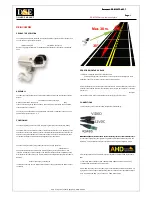
ASSEMBLE
SIDE PANELS
8
SELECT:
4 x 1.920 m Gable Wall Sheets (Angled)
4 x 1.980 m Gable Wall Sheets (Angled)
2 x 2.020 m Top Plates (Red)
2 x 2.020 m Bottom Plates (Green)
96 x 30mm Galv Clouts
12 x Rivets
IMPORTANT—IF YOU CHOOSE TO RAISE YOUR TIMBER
BASE PLATE –READ THE FOLLOWING;
For sheds with Raised Base Plate option only (see page 6), deduct
30mm from measurement shown between Top and Bottom Plates on
all wall panels, so cladding protrudes 20mm below bottom plate
.
STEP 1:
•
Lay out 1 x Top plate and 1 x Bottom plate on a flat surface as shown
(corner cut
-
outs to face outwards).
Measurements between Top and
Bottom plates are critical to ensure wall panels fit together.
STEP 2:
•
Place 2 x 1.920 m wall sheets and 2 x 1.980 m wall sheets on top
of timber plates with bottom of sheets flush with each other.
•
Rivet sheets together on overlaps as shown
.
STEP 3:
•
Nail wall sheets to the Top Plate at each end making
sure that the top corners of the sheets are flush with
the top of the Top Plate and that the sides of the wall
sheet overhang the Top Plate by approx 15mm as
shown.
•
Check that the Top Plate is straight then nail the
Wall sheet to the Top Plate, 2 clouts per pan.
(see
fig. 1
).
Standard Shed —
Bottom Plate will protrude be-
low wall sheet by approximately 10mm.
Raised base plate shed —
Wall sheet will protrude
below the Bottom Plate by 20mm
.
STEP 4:
•
Nail the wall sheets to the Bottom Plate at each end ensuring each side
of wall sheets overhangs the end of Bottom Plate by 15mm. Check that
the distance between the Top and Bottom Plates is correct. (As per
diagram in step 1)
•
Check that the Bottom Plate is straight then nail the wall sheets to the
Bottom Plate, two clouts per pan (see fig. 1).
fig.1
RIB
PAN
CLOUT
TIMBER PLATE
TOP PLATE
BOTTOM PLATE
RIVET
RIVET
RIVET
RIVET
RIVET
RIVET
TOP PLATE
15mm
15mm
BOTTOM PLATE
1853mm
1853mm
TOP PLATE
BOTTOM PLATE
15mm
15mm
1853mm
1853mm
TOP PLATE
REPEAT THESE STEPS TO MAKE SECOND SIDE WALL PANEL
15mm
IMPORTANT—IF YOU CHOOSE TO RAISE YOUR TIMBER
BASE PLATE –READ THE FOLLOWING;
For sheds with Raised Base Plate option only (see page 6), deduct
30mm from measurement shown between Top and Bottom Plates on
all wall panels, so cladding protrudes 20mm below bottom plate
.
Ie. reduce 1850mm to 1820mm between Plates.
Summary of Contents for SM2520
Page 1: ...ASSEMBLY INSTRUCTIONS SM2520 BASE SIZE 2 520m x 2 020m...
Page 2: ......


































